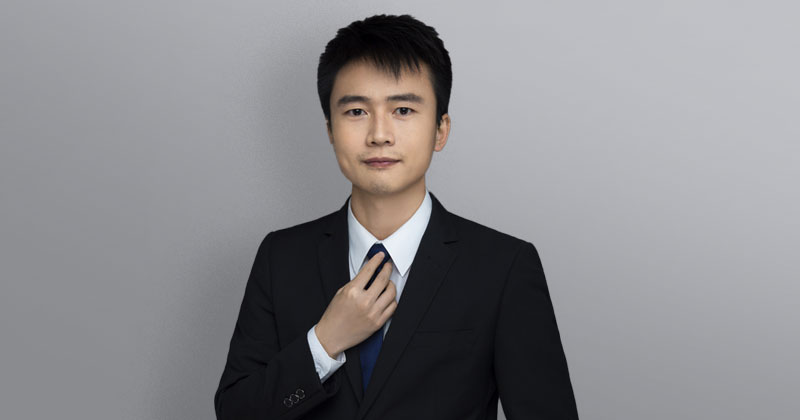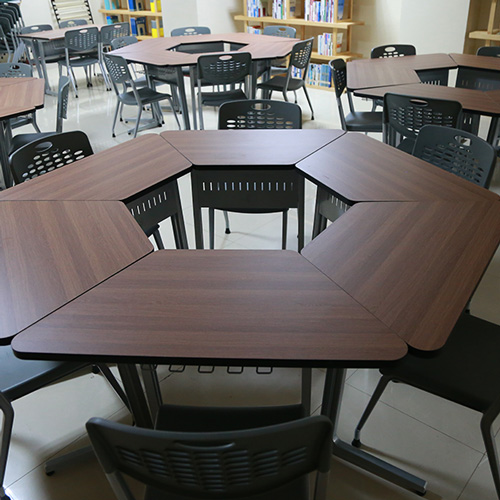Overview
The School of Management, founded in 2004, is one of the earliest established academic divisions at Qingdao City University. Located in Qingdao, one of the largest metropolitan areas in northern China, our vision is to become a management school of considerable regional influence that empowers the growth of smart cities. Our mission is to prepare business professionals with a sense of social responsibility and innovation awareness for the challenges of globalization and digitalization. We consider student development as our top priority and are dedicated to leverage high quality resources at home and abroad to educate a new generation of high-quality business professionals for today’s dynamic business world.
The School currently offers four undergraduate programs: International Business, Marketing, Logistics Management, and Cross-border E-commerce. It also offers three associate degree programs: International Business, Marketing, and E-commerce. Furthermore, the School is equipped with 9 practical training platforms, 6 specialized classrooms, and 1 computer lab for practical training, ensuring the integration of theory with practice.
Graduates from our degree programs demonstrate strong competitiveness in labor markets due to their solid professional expertise and excellent adaptability. In recent years, the employment rate of our graduates has been consistently over 90%.
Majors
Faculty
We possess a faculty team of excellent education and strong practical skills. Currently, among our full-time faculty, 50% hold professional credentials, and 51% have earned their degrees from overseas universities. In recent years, the School of Management faculty have published over 80 academic papers and won 28 research grants.
As a tradition, we highlight the role that faculty play in advising students to win national academic competitions. These competitions include: the "POCIB National College Student Competition for Foreign Trade Practice," the "National Business Elite Challenge for College Students," the "National College Student Logistics Simulation Design Competition," the "National College Student Smart Supply Chain Innovation and Entrepreneurship Challenge," the National College Student "Innovation, Creativity, and Entrepreneurship" Challenge, and the "TFC" Supply Chain Global Student Business Challenge, among others.
In March 2025, the faculty team in E-commerce successfully joined the "Ministry of Education Virtual Teaching and Research Office for E-commerce Majors".

Zhou LU
Assistant to the President and Dean of the School of Management
Full Professor in Economics; Graduate Program Advisor PhD in Economics, Johns Hopkins University, USA M.A. in Economics, University of California at Davis B.S. in International Business, Zhejiang University; Bachelor of Laws, China Foreign Affairs University Previous Faculty Appointments: the City University of New York, New York Institute of Technology, and Tianjin University of Commerce Journal Publications: 5 at high-quality journals in Chinese, and 40+ (co-authored) at high-quality international journals in English (SSCI & SCI). Research Projects: Primary Investigator for 1 national-level research project (the National Social Science Fund of China) & 2 provincial grant research projects.

Chuangye YAN
Vice Dean of the School of Management
PhD, Peking University Master, Wuhan University Bachelor, Wuhan University Previous Industry Appointments: Marketing Strategy Director, Ogilvy; Senior Marketing Expert (Director Level), Huawei; Marketing Head, Cloud Computing BG, HP; Senior Marketing Manager, IBM.

Peiliang DU
Assistant to the Dean, School of Management
Master's degree in Accounting, University of Sydney Master's degree in Economics, Accounting and Finance, University of Bristol Bachelor's degree in International Business, Shandong University Australian Vocational Teacher Qualification Certificate CPA Australia NAATI Certified Translator (English to Chinese, Level 3)

Rong LIU
Director of Academic Quality Assurance, School of Management
Master in Business Administration, Dongguk University, South Korea Bachelor in Business Administration, Dongguk University, South Korea Research Projects: 4 provincial -level projects and 4 municipal-level projects. Publications: 10+ papers at journals in Chinese, 2 papers at high-quality journals in English (SSCI). Student Academic Competition Advising: 4 national-level awards and 10+ provincial -level awards, including a provincial gold award in the Shandong "CCB Cup" Innovation and Entrepreneurship Competition.

Yuting Zhuang
Academic Leader, School of Management
PhD in Management, University of Otago, New Zealand Master of Management, University of Otago, New Zealand Bachelor of Commerce majoring in International Business, University of Otago, New Zealand Visiting Professor at University of Otago, Beijing University of Posts and Telecommunications, Central South University, and Shandong University of Finance and Economics, etc. Co-founder of the "Academic Kung-fu Community," Editor-in-chief of "Academic Skills Guide for Dummies" Sole-authored "Pursuing Formal Theories: An East-West Philosophical Synthesis Approach in Formal Grounded Theorising" Has held full-time teaching positions at International College of Xiamen University, Pacific International Hotel Management School (New Zealand), and Shanghai Lixin University of Accounting and Finance; and has served as CTO and CEO in muptiple industries.

Xiaohang Zhou
Teacher/Faculty, School of Business Administration
PhD, Shanghai University of Finance and Economics Master, Northeast Normal University Bachelor, Northwest University Research Project: Primary Investigator for 1 national level project (Humanity and Social Science Foundation of Ministry of Education) Major Participant in multiple provincial and government projects, including Shanghai (Provincial/Ministerial Level) Fund Project, Henan Provincial Government Department Project, "Double First-Class" Guidance Project. As of November 2025, has published 4 CSSCI papers and 5 SSCI papers. Co-authored 1 Chinese monograph. Serves as a reviewer for multiple international journals.

Yilong Du
Deputy Director of Logistic Management Program, School of Management
Master in Logistics Engineering, Ocean University of China National 1+X Logistics Management Vocational Skill Advanced Certification Formerly served as Director of R&D Management Department and Project Manager at Hisense Group Commercial Display Company Lecturer at Hisense College, Hisense Group Over 10 years of practical work experience in enterprise management and supply chain management

Yuqing Wu
Teacher/Faculty, School of Business Administration
Master in Business and Data Analytics, City University of Hong Kong Bachelor in German Literature, Ocean University of China Formerly in European Market Operations Management at Qingdao Star Business E-commerce Co., Ltd., and E-commerce Operations Management at Hisense International Marketing Co., Ltd. 5 years of experience in cross-border e-commerce and international marketing
Teaching Features
1. Internationalization
We take an internationalized approach to our teaching. In Teaching Content: We adopt global business cases and real-world business practices for class-room use in broadening students' horizons. In Teaching Methodology: We promote a shift from a "teaching-centered" to a "learning-centered" approach. We implement a small-class-size instruction model—using heuristic, experiential, discussion-based, project-based, case-based, and participatory methods. We encourage inquiry-based learning to help students cultivate critical thinking and innovation awareness.
2. Application-Orientation
We strongly emphasize an application-oriented approach:
Our curriculum objectives are designed based on the needs of regional economic development. We constantly examine labor market demands in search for up-to-date professional competencies and job skills. Practical Learning: We make full use of practical training platforms to increase the proportion of practical courses within the curriculum.
As we highlight the essential role that national academic competitions play in the development of student skills, we integrate national academic competitions with classroom teaching, adhering to the approach of "promoting teaching through competition and promoting learning through competition.
3. Extra-curriculum Activities: We take a holistic approach to our program. School-Business Cooperation: We strengthen school-business cooperation through "Business Leaders in the Classroom" to make full use of high-quality business resources. Partner Companies: The School has introduced word-class companies, such as SF Express and Jingdong Logistics, to campus activities to strengthen school-business partnership. Furthermore, we provide our students with internship opportunities at 50+ partner companies.
Facilities
We are equipped with eight practical training platforms:
·POCIB i+ Integrated Skills Training and Competition ·Platform Software for International Trade
·TFC Supply Chain Operations Simulation Platform
·SIM-Trade Internship Platform for International Trade Simulation Teaching
·SIM-Marketing Simulation Teaching Software for Marketing
·Third-Party Logistics Teaching Software
·SEG Foreign Trade Documentation Teaching System
IELS Virtual E-commerce Logistics Operations Software
·Business Sand Table Simulation
Additionally, we provide students with six specialized classrooms. Using cutting-edge technology, these classrooms showcase the curriculum essence and the core concepts of corporate operation and management. This reinforces students' professional literacy and business awareness, creates an excellent learning environment, and inspires students' learning interests.

Graduates Development
Graduates mainly enter public institutions, government departments and well-known companies to work in management and specific business work. At present, a large number of students have grown into the hard-cores of the companies. Among the graduates who choose to seek higher education, some students have entered the top 100 universities in the QS World University Comprehensive Ranking and well-known domestic universities over the years.
University of Manchester, University of Sydney, Ocean University of China, Renmin University of China, and Dalian University of Technology.
Parts of representative enterprises:China Construction Bank Corporation, China State Construction Engineering Co., Ltd., Qingdao Jian'an Holding Group, Beijing Yunting Law Firm, and Shandong Genzon Information Technology Co., Ltd.